Saturday, November 04, 2017
Saint Charles Borromeo, Bishop & Confessor
Friday, November 03, 2017
Saint Martin de Porres, Confessor
In my 1959 Saint Joseph Daily Missal, November 3rd is listed in the section with the Propers of the Saints as "Mass Of the Season," meaning it was considered a ferial day of the Time After Pentecost. But, there is an addendum in the back with a few additional Saints' days, either for newly canonized saints, or saints whose feasts are celebrated in particular locations. Sure enough, for November 3rd is the listing, "Blessed Martin de Porres". He has been canonized since 1962.
Saint Martin de Porres, please pray for us!
Thursday, November 02, 2017
All Souls' Day, 2017
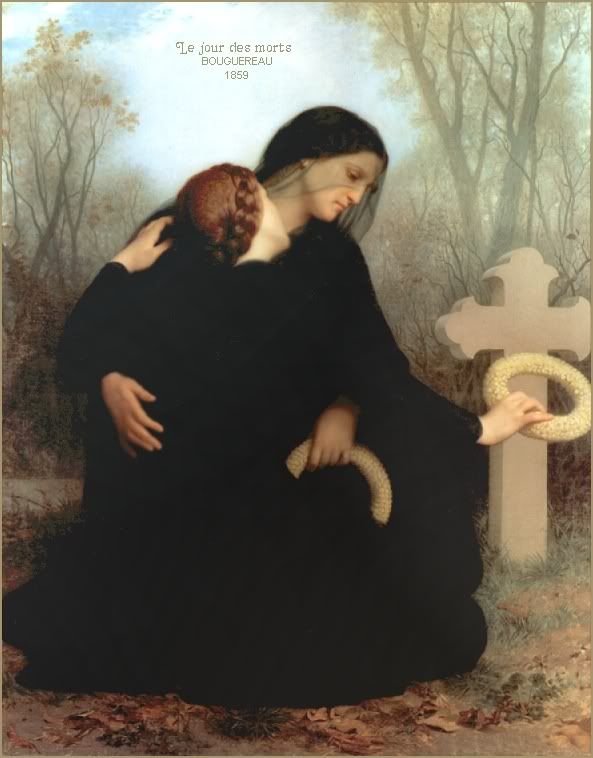
All Saints' Day, by Bouguereau
V. Requiem aeternam dona eis, Domine.
R. Et lux perpetua luceat in eis.
V. Requiescant in pace.
R. Amen.
Kathryn & George
Thomas
Nora & Thomas
Felicia & Louis
Patrick & Susan
Bridget & Michael
Herbert
Barbara
Austin
Mary & Charles
Ida & Edward
Rudolph
Emily & Anthony
Mary and John
Tom
Joe
Elmer
Grace & William
Winifred & Louis
Rose & Harold
Mildred & Frank
Minerva & Joseph
Bea & Roland
Vincent
William
Samson
Patricia
Mary & James
Brother Daniel
Thomas
Joseph
June
Gene
Glenn
Henrietta
Nick
Kevin
Father Flaherty
Mary & John
Brother Chad, CFX
Father Mahoney, SJ
Father Cheney, SJ
Father Fitzptarick
Doctor Miller
Doctor Daly
Frank
Tommy
Memorial Prayer for the Suffering Souls in Purgatory
(For Private Use Only)
Almighty God, Father of Goodness and love,
have mercy on the Poor Suffering Souls,
and grant Thine aid:
To my dear parents and ancestors;
Jesus, Mary, Joseph! My Jesus Mercy.
To my brothers and sisters and other near relatives;
Jesus, Mary, Joseph! My Jesus Mercy.
To my benefactors, spiritual and temporal; etc.
To my former friends and subjects;
To all for whom love or duty bids me pray;
To those who have suffered disadvantage or harm through me;
To those who have offended me;
To all those who are especially beloved by Thee;
To those whose release is at hand;
To those who desire most to be united with Thee;
To those who endure the greatest suffering;
To those whose release is most remote;
To those who are least remembered;
To those who are most deserving on account of their services to the Church;
To the rich, who now are the most destitute;
To the mighty, who now are as lowly servants;
To the blind, who now see their folly;
To the frivolous, who spent their time in idleness;
To the poor, who did not seek the treasures of Heaven;
To the tepid, who devoted little time to prayer;
To the indolent, who were negligent in performing good works;
To those of little faith, who neglected the frequent reception of the Sacraments;
To the habitual sinners, who owe their salvation to a miracle of grace;
To parents who failed to watch over their children;
To superiors who were not solicitous for the salvation of those entrusted to them;
To the souls of those who strove for hardly anything but riches and pleasures;
To the worldly-minded, who failed to use their wealth and talents in the service of God;
To those who witnessed the death of others, but would not think of their own;
To those who did not provide for the great journey beyond, and the days of tribulation;
To those whose judgment is so severe because of the great things entrusted to them;
To the popes, rulers, kings and princes;
To the bishops and their counselors;
To my teachers and spiritual advisors;
To the deceased priests of this diocese;
To all the priests and religious of the whole Catholic Church;
To the defenders of the Holy Faith;
To those who died on the battlefield;
To those who are buried in the sea;
To those who died of stroke or heart attack;
To those who died without the last rites of the Church;
To those who shall die within the next twenty-four hours;
To my own poor soul when I shall have to appear before Thy judgment seat;
V. O Lord, grant eternal rest to all the souls of the faithful departed,
R. And let perpetual light shine upon them.
V. May they rest in peace.
R. Amen.
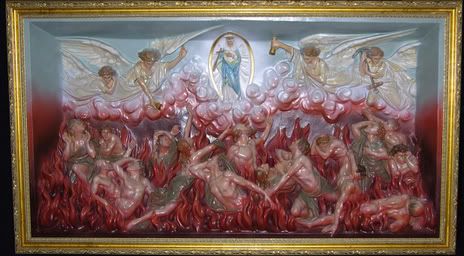
Dies Irae
The day of wrath, that day
which will reduce the world to ashes,
as foretold by David and the Sybil.
What terror there will be,
when the Lord will come
to judge all rigorously!
The trumpet, scattering a wondrous sound
among the graves of all the lands,
will assemble all before the Throne.
Death and Nature will be astounded
when they see a creature rise again
to answer to the Judge.
The book will be brought forth
in which all deeds are noted,
for which humanity will answer.
When the judge will be seated,
all that is hidden will appear,
and nothing will go unpunished.
Alas, what will I then say?
To what advocate shall I appeal,
when even the just tremble?
O king of redoutable majesty,
who freely saves the elect,
save me, o fount of piety!
Remember, merciful Jesus,
that I am the cause of your journey,
do not lose me on that day.
You wearied yourself in finding me.
You have redeemed me through the cross.
Let not such great efforts be in vain.
O judge of vengeance, justly
make a gift of your forgiveness
before the day of reckoning.
I lament like a guilty one.
My faults cause me to blush,
I beg you, spare me.
You who have absolved Mary,
and have heard the thief's prayer,
have also given me hope.
My prayers are not worthy,
but you, o Good One, please grant freely
that I do not burn in the eternal fire.
Give me a place among the sheep,
separate me from the goats
by placing me at your right.
Having destroyed the accursed,
condemned them to the fierce flames,
Count me among the blessed.
I prostrate myself, supplicating,
my heart in ashes, repentant;
take good care of my last moment!
That tearful day,
when from the ashes shall rise again.
Sinful man to be judged.
Therefore pardon him, o God.
Merciful Lord Jesus,
give them rest.
Amen.
Dies irae, dies illa
solvet saeclum in favilla,
teste David cum Sybilla.
Quantus tremor est futurus,
quando judex est venturus,
cuncta stricte discussurus.
Tuba mirum spargens sonum
per sepulchra regionum,
coget omnes ante thronum.
Mors stupebit et natura,
cum resurget creatura,
judicanti responsura.
Liber scriptus proferetur,
in quo totum continetur,
unde mundus judicetur.
Judex ergo cum sedebit,
quidquid latet apparebit,
nil inultum remanebit.
Quid sum miser tunc dicturus?
Quem patronum rogaturus,
cum vix justus sit securus?
Rex tremendae majestatis,
qui salvandos salvas gratis,
salva me, fons pietatis.
Recordare Jesu pie,
quod sum causa tuae viae,
ne me perdas illa die.
Quaerens me sedisti lassus,
redemisti crucem passus,
tantus labor non sit cassus.
Juste judex ultionis,
donum fac remissionis
ante diem rationis.
Ingemisco tanquam reus,
culpa rubet vultus meus,
supplicanti parce, Deus.
Qui Mariam absolvisti,
et latronem exaudisti,
mihi quoque spem dedisti.
Preces meae non sunt dignae,
sed tu, bonus, fac benigne,
ne perenni cremer igne.
Inter oves locum praeta,
et ab hoedis me sequestra,
statuens in parte dextra.
Confutatis maledictis,
flammis acribus addictis,
voca me cum benedictis.
Oro supplex et acclinis,
cor contritum quasi cinis,
gere curam mei finis.
Lacrimosa dies illa,
qua resurget ex favilla
judicandus homo reus -< br />Huic ergo parce, Deus.
Pie Jesu Domine,
dona eis requiem.
Amen.

November Plaints
Rest Eternal Grant Them, Lord!
Take we up the touching burden of November plaints,
Pleading for the Holy Souls, God’s yet uncrowned Saints.
Still unpaid to our departed is the debt we owe;
Still unransomed, some are pining, sore oppressed with woe.
Friends we loved and vowed to cherish call us in their need:
Prove we now our love was real, true in word and deed.
“Rest eternal grant them, Lord!” full often let us pray—
“Requiem æternam dona eis, Domine!”
Requiem Aeternam
Requiem aeternam dona eis Domine: et lux perpetua luceat eis.
Requiescant in pace.
Amen.
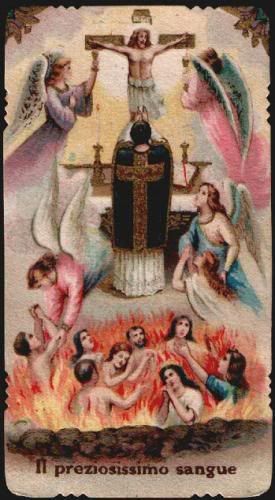
Another Litany for the Suffering Souls
(For Private Use Only)
Lord, have mercy on us.
Christ, have mercy on us.
Lord, have mercy on us.
Christ, hear us.
Christ, graciously hear us.
God the Father of Heaven ,
Have mercy on the Souls of the Faithful departed.
God the Son, Redeemer of the world,
Have mercy on the Souls of the faithful departed.
God the Holy Ghost,
Have mercy on the Souls of the faithful departed.
Holy Trinity, One God,
Have mercy on the Souls of the faithful departed.
Holy Mary ,
Pray for the Souls of the faithful departed.
Holy Mother of God,
Pray for the Souls of the faithful departed.
Saint Michael, etc.
Saint Gabriel,
All ye holy Angels and Archangels,
Saint John the Baptist,
Saint Joseph,
All ye holy Patriarchs and Prophets,
Saint Peter,
Saint Paul,
Saint John,
All ye holy Apostles and Evangelists,
Saint Stephen,
Saint Lawrence,
All ye holy Martyrs,
Saint Gregory,
Saint Ambrose,
All ye holy bishops and confessors,
Saint Mary Magdalen,
Saint Catherine,
All ye holy Virgins and widows,
All ye Saints of God,
Make intercession for the Souls of the faithful departed.
Be merciful,
Spare them, O Lord.
Be merciful,
Hear them, O Lord.
From all evil,
O Lord, deliver them.
From Thy wrath,
O Lord, deliver them.
From the flame of fire, etc.
From the region of the shadow of death,
Through Thine Immaculate Conception,
Through Thy Nativity,
Through Thy Most Holy Name,
Through the multitude of Thy tender mercies, Through Thy most bitter Passion,
Through Thy most Sacred Wounds,
Through Thy most Precious Blood,
Through Thine ignominious death, by which
Thou hast destroyed our death,
We sinners,
We beseech Thee, hear us.
O Thou Who didst absolve the sinner woman and hear the prayer of the good thief,
We beseech Thee, hear us.
That thou wouldst release our deceased parents, relations and benefactors
from the bonds of their sins and the punishment for them, etc
That Thou wouldst hasten the day of visiting Thy faithful detained in the receptacles
of sorrow, and wouldst transport them to the city of eternal peace,
That Thou wouldst shorten the time of expiation for their sins and graciously
admit them into the holy sanctuary, into which no unclean thing can enter,
That through the prayers and alms of Thy Church, and especially by the inestimable
Sacrifice of Thy Holy Altar, Thou wouldst receive them into the tabernacle of rest
and crown their longing hopes with everlasting fruition,
Son of God,
Lamb of God, Who takest away the sins of the world,
Grant them eternal rest.
Lamb of God, Who takest away the sins of the world,
Grant them eternal rest.
Lamb of God, Who takest away the sins of the world,
Grant them eternal rest.
Christ, hear us.
Christ, graciously hear us.
Lord, have mercy on us. Christ, have mercy on us.
Lord, have mercy on us.
Our Father, Who art in Heaven, etc.
V. And lead us not into temptation,
R. But deliver us from all evil. Amen.
V. From the gates of Hell,
R. Deliver their Souls, O Lord.
V. May they rest in peace.
R. Amen.
V. O Lord, hear my prayer ,
R. And let my cry come unto Thee.
Let Us Pray.
O God, Creator and Redeemer of all the faithful, grant to the Souls of Thy departed servants the remission of all their sins, that through our pious supplications they may obtain the pardon which they have always desired. Through Jesus Christ Our Lord. R. Amen.
O God, the Giver of pardon and the Lover of the salvation of men, we beg Thy clemency on behalf of our brethren, kinsfolk and benefactors who have departed this life, that by the intercession of the Blessed Virgin Mary and of all the Saints, Thou wouldst receive them into the joys of Thine everlasting kingdom. Through Christ Our Lord. R. Amen.
O God, to Whom it belongs always to have mercy and to spare, be favorably propitious to the Souls of Thy servants and grant them the remission of all their sins, that being delivered from the bonds of this mortal life, they may be admitted to life everlasting. Through Jesus Christ Our Lord.
Amen.
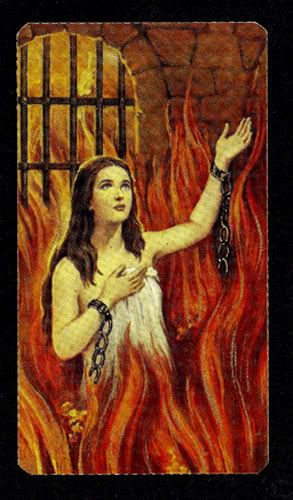
Wednesday, November 01, 2017
All Hallows' Day, 2017
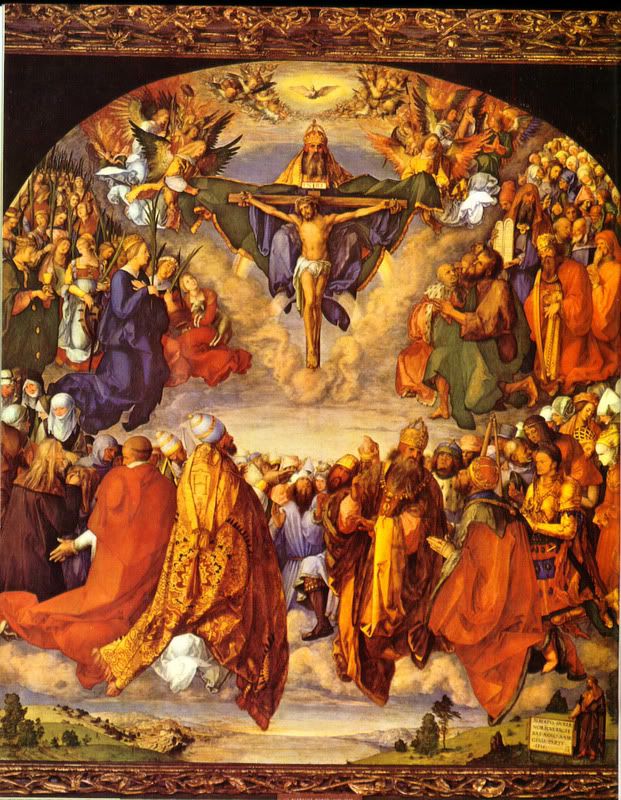
For All the Saints
For all the saints, who from their labors rest,
Who Thee by faith before the world confessed,
Thy Name, O Jesus, be forever blessed.
Alleluia, Alleluia!
Thou wast their Rock, their Fortress and their Might;
Thou, Lord, their Captain in the well fought fight;
Thou, in the darkness drear, their one true Light.
Alleluia, Alleluia!
For the Apostles’ glorious company,
Who bearing forth the Cross o’er land and sea,
Shook all the mighty world, we sing to Thee:
Alleluia, Alleluia!
For the Evangelists, by whose blest word,
Like fourfold streams, the garden of the Lord,
Is fair and fruitful, be Thy Name adored.
Alleluia, Alleluia!
For Martyrs, who with rapture kindled eye,
Saw the bright crown descending from the sky,
And seeing, grasped it, Thee we glorify.
Alleluia, Alleluia!
O blest communion, fellowship divine!
We feebly struggle, they in glory shine;
All are one in Thee, for all are Thine.
Alleluia, Alleluia!
O may Thy soldiers, faithful, true and bold,
Fight as the saints who nobly fought of old,
And win with them the victor’s crown of gold.
Alleluia, Alleluia!
And when the strife is fierce, the warfare long,
Steals on the ear the distant triumph song,
And hearts are brave, again, and arms are strong.
Alleluia, Alleluia!
The golden evening brightens in the west;
Soon, soon to faithful warriors comes their rest;
Sweet is the calm of paradise the blessed.
Alleluia, Alleluia!
But lo! there breaks a yet more glorious day;
The saints triumphant rise in bright array;
The King of glory passes on His way.
Alleluia, Alleluia!
From earth’s wide bounds, from ocean’s farthest coast,
Through gates of pearl streams in the countless host,
And singing to Father, Son and Holy Ghost:
Alleluia, Alleluia!
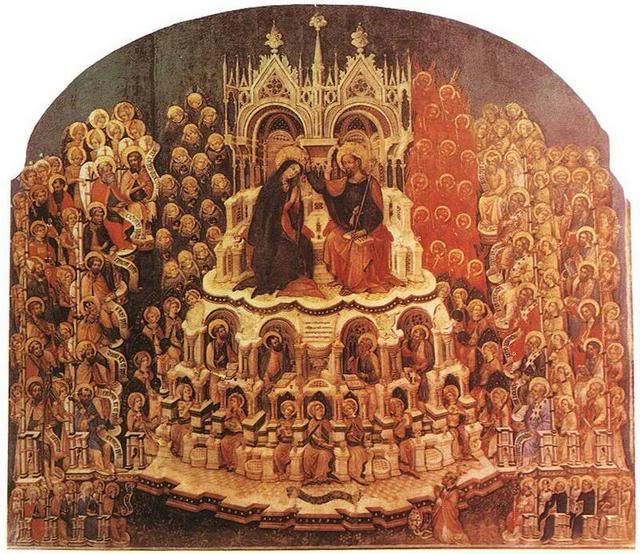
The Litany of the Saints
Lord, have mercy on us. (Lord have mercy on us.)
Christ, have mercy on us. (Christ have mercy on us.)
Lord, have mercy on us. (Lord, have mercy on us.)
Christ, hear us. (Christ, hear us.)
Christ, graciously hear us. (Christ, graciously hear us.)
God the Father of heaven, (have mercy on us.)
God the Son, Redeemer of the world, (have mercy on us.)
God the Holy Ghost, (have mercy on us.)
Holy Trinity, one God, (have mercy on us.)
Holy Mary, (Pray for us.)
Holy Mother of God,
Holy Virgin of virgins,
St. Michael,
St. Gabriel,
St. Raphael,
All ye holy Angels and Archangels,
All ye holy orders of blessed Spirits,
St. John the Baptist,
St. Joseph,
All ye holy Patriarchs and Prophets,
St. Peter,
St. Paul,
St. Andrew,
St. James,
St. John,
St. Thomas,
St. James,
St. Philip,
St. Bartholomew,
St. Matthew,
St. Simon,
St. Thaddeus,
St. Matthias,
St. Barnabas,
St. Luke,
St. Mark,
All ye holy Apostles and Evangelists,
All ye holy Disciples of the Lord,
All ye holy Innocents,
St. Stephen,
St. Lawrence,
St. Vincent,
SS. Fabian and Sebastian,
SS. John and Paul,
SS. Cosmas and Damian,
SS. Gervase and Protase,
All ye holy Martyrs,
St. Sylvester,
St. Gregory,
St. Ambrose,
St. Augustine,
St. Jerome,
St. Martin,
St. Nicholas,
All ye holy Bishops and Confessors,
All ye holy Doctors,
St. Anthony,
St. Benedict,
St. Bernard,
St. Dominic,
St. Francis,
All ye holy Priests and Levites,
All ye holy Monks and Hermits,
St. Mary Magdalen,
St. Agatha,
St. Lucy,
St. Agnes,
St. Cecilia,
St. Catherine,
St. Anastasia,
All ye holy Virgins and Widows,
All ye holy Saints of God, (Make intercession for us.)
Be merciful, (Spare us, O Lord.)
Be merciful, (Graciously hear us, O Lord.)
From all evil, O Lord (Deliver us.)
From all sin,
From Thy wrath,
From sudden and unlooked for death,
From the snares of the devil,
From anger, and hatred, and every evil will,
From the spirit of fornication,
From lightning and tempest,
From the scourge of earthquakes,
From plague, famine and war,
From everlasting death,
Through the mystery of Thy holy Incarnation,
Through Thy Coming,
Through Thy Birth,
Through Thy Baptism and holy Fasting,
Through Thy Cross and Passion,
Through Thy Death and Burial,
Through Thy holy Resurrection,
Through Thine admirable Ascension,
Through the coming of the Holy Ghost, the Paraclete.
In the day of judgment.
We sinners, (We beseech Thee, hear us.)
That Thou wouldst spare us,
That Thou wouldst pardon us,
That Thou wouldst bring us to true penance,
That Thou wouldst vouchsafe to govern and preserve Thy holy Church,
That Thou wouldst vouchsafe to preserve our Apostolic Prelate, and all orders of the Church in holy religion,
That Thou wouldst vouchsafe to humble the enemies of holy Church,
That Thou wouldst vouchsafe to give peace and true concord to Christian kings and princes,
That Thou wouldst vouchsafe to grant peace and unity to the whole Christian world,
That Thou wouldst call back to the unity of the Church all who have strayed from her fold, and to guide all unbelievers into the light of the Gospel
That Thou wouldst vouchsafe to confirm and preserve us in Thy holy service,
That Thou wouldst lift up our minds to heavenly desires,
That Thou wouldst render eternal blessings to all our benefactors,
That Thou wouldst deliver our souls, and the souls of our brethren, relations, and benefactors, from eternal damnation,
That Thou wouldst vouchsafe to give and preserve the fruits of the earth,
That Thou wouldst vouchsafe to grant eternal rest to all the faithful departed,
That Thou wouldst vouchsafe graciously to hear us,
Son of God,
Lamb of God, who take away the sins of the world, (spare us, O Lord.)
Lamb of God, who take away the sins of the world, (graciously hear us, O Lord.)
Lamb of God, who take away the sins of the world, (have mercy on us.)
Christ, (hear us.)
Christ, (graciously hear us.)
Lord, have mercy, (Lord, have mercy.)
Christ, have mercy, (Christ, have mercy.)
Lord, have mercy, (Lord, have mercy.)
[Our Father inaudibly] And lead us not into temptation (but deliver us from evil.)
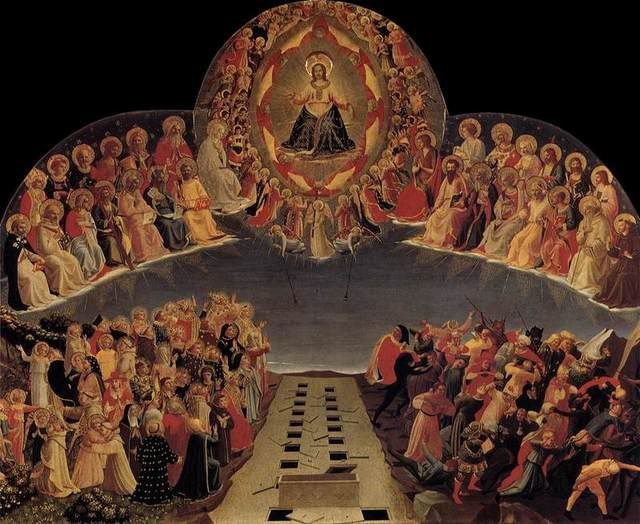
Penitens has a wonderful listing of the saints from the litany, with illustrations.
Also, see Jay at Pro Ecclesia for an excellent summation, bringing together and uniting the history of Halloween and Hallowmas.
Terry at Abbey Roads 2 has another excellent post.
Hallowmas in the Philippines, at Ecce Ego, Quia Vocasti Me.
Monday, October 30, 2017
The Story Of the Jack-O-Lantern

Many of you will be familiar with this story, but it illustrates the Christian origins of one of the most cherished Halloween customs.
Back in the days after Saint Patrick had converted Ireland, there lived an Irishman named Jack. Now Jack was a notoriously mean, stingy, and hard-drinking reprobate. Jack wanted a drink, but could not afford one. He somehow summoned the Devil, and offered him his soul for a drink. The Devil agreed.
Jack asked for hard cider, and asked the Devil to climb a tree to get apples to make cider from. The Devil climbed up, and sent down some apples. Once Jack had the apples, he quickly carved a cross in the trunk of the tree, making it impossible for the Devil to come down out of the tree. Jack and the Devil agreed that Jack would efface the cross, so that the Devil could come down, and the Devil would never accept Jack's soul into Hell. Jack went off with the cider and laughing in his sleeve.
Jack continued his life of sin. When he finally died, he presented himself at the Gates of Heaven, only to be turned away for being in life too mean, too tight, and too thirsty.
"Well," Jack said, "off to Hell I go." But when he got there, the Devil reminded Jack of their bargain, and refused him. To speed him on his way, the Devil hurled a coal from the fires of Hell at Jack.
Jack had been eating a turnip, and had hollowed it out fairly well. Jack defended himself from the burning coal by putting up the turnip, and caught the coal in it. Since then, using his hollowed out turnip with its coal from the fires of Hell as a lantern, Jack has been wandering the earth in search of a drink and a refuge.
He is known as Jack of the Lantern, or jack-o-lantern.
In Ireland, it was the custom to carve grotesque faces into turnips, and use them as lanterns for going a'souling around Hallowmas.
When the Irish came to America, they found turnips not particularly popular. But the Yankees used pumpkins for everything, including soup tureens, ladles, and storage pots. The Irish found that pumpkins made excellent substitutes for Jack's turnip lantern. That is why we carve pumpkins into jack-o-lanterns to this day.
The Origins Of Trick-Or-Treating

Another cherished Halloween custom is trick-or-treating. This is another one with some Christian origins.
In Celtic times, the inhabitants of the British Isles believed that on the night of October 31, which was their new year's eve, the spirits of those who had died during that year could come back to visit their families. Offerings of food were left by the living for these relatives.
Some donned the clothes of the dead, and begged for the treats from door to door in the village. Sometimes banquets were laid out, after which the people in the guise of the dead were escorted to the edge of town (we still send what we don't want to the edge of town-to the dump).
The Church looked somewhat askance at this custom. But, as the Church did with many pre-Christian customs that we still observe as Christmas rituals, it gave the celebration of the night of October 31st a Christian content.
First All Saints' Day was imposed on November 1st, and made a day of mandatory attendance at Mass. Later, a day to honor all the faithful departed, All Souls' Day was added on November 2nd.
The custom of dressing up in the clothes of the dead and going door-to-door was transformed into the "luck visit" ritual called "going a-souling." Young people would visit, and beg for soul cakes (square cakes of something like raisin bread), sometimes singing souling songs.
If given a soul cake, the visitor would promise to pray for the soul of the donor, or anyone he designated. This custom was, in the 19th century revived and transformed into trick-or-treating.
You will notice a strong resemblence between trick-or-treating and Christmas "luck visits" like carolling, John Canoe, wassailing, the Plough Monday ritual, and the wren boys in Ireland. In England, once Hallowmas was more-or-less replaced with Guy Fawkes Night, and souling fell out of fashion, children used to go door to door to beg "A penny for the Guy?". There was also here in the US, especially in New York, in the 19th century a Thanksgiving Day begging door-to-door ritual which is similar.
They are indeed related customs. Luck or good fortune, in this case in the form of prayers for the soul, are exchanged for gifts of food or drink. Both are new year rituals, with trick-or-treating a reminder that October 31st was new year's eve for the Celts.
Today many Catholic schools have children dress up as saints, and attend Mass on All Saints Day so attired. This is another adaptation of the "luck visit" ritual that is at the root of trick-or-treating. And many children now have two costumes, something spooky for All Hallows' Eve, and a saint's attire for All Hallows.
Why not?

Sunday, October 29, 2017
Christus Rex, 2017

Christ the King falls on the last Sunday in October in the traditional ordo.
Christ Himself speaks of His Own kingly authority [see link for Bible Citations]: in His last discourse, speaking of the rewards and punishments that will be the eternal lot of the just and the damned; in His reply to the Roman magistrate, who asked Him publicly whether He were a king or not; after His resurrection, when giving to His Apostles the mission of teaching and Baptizing all nations, He took the opportunity to call Himself king, confirming the title publicly, and solemnly proclaimed that all power was given Him in Heaven and on earth. These words can only be taken to indicate the greatness of his power, the infinite extent of His kingdom. What wonder, then, that He Whom St. John calls the "prince of the kings of the earth" appears in the Apostle's vision of the future as He Who "hath on His garment and on His thigh written 'King of kings and Lord of lords!'." It is Christ Whom the Father "hath appointed heir of all things"; "for He must reign until at the end of the world He hath put all his enemies under the feet of God and the Father."
It was surely right, then, in view of the common teaching of the sacred books, that the Catholic Church, which is the kingdom of Christ on earth, destined to be spread among all men and all nations, should with every token of veneration salute her Author and Founder in her annual liturgy as King and Lord, and as King of Kings. And, in fact, she used these titles, giving expression with wonderful variety of language to one and the same concept, both in ancient psalmody and in the Sacramentaries.
Pope Pius XI, Encyclical Letter, QUAS PRIMAS, #11-12
Catholic Ghost Stories
Taken from Hell plus How to Avoid Hell by Fr. FX Schouppe, S.J. and Thomas A. Nelson. (TAN Books & Publishers, Inc., 1989)
A holy priest was exorcizing a demoniac, and he asked the demon what pains he was suffering in Hell. "An eternal fire," he answered, "an eternal malediction, an eternal rage, and a frightful despair at being never able to gaze upon Him who created me." "What would you do to have the happiness of seeing God?" "To see Him but for one moment, I should willingly consent to endure my torments for 10,000 years. But vain desires! I shall suffer forever and never see Him!"
On a like occasion, the exorcist inquired of the demon what was his greatest pain in Hell. He replied with an accent of indescribable despair: "Always, always! Never; never!"
Father Nieremberg, in his work "The Difference between Time and Eternity", speaks of an unfortunate sinner, who, as the result of his evil ways, had lost the Faith. His virtuous wife exhorted him to return to God and reminded him of Hell, but he would answer obstinately: "There is no Hell." One day his wife found him dead, and strange circumstance, he held in his hand a mysterious paper on which in large characters was traced this terrifying avowal: "I now know that there is a Hell!"
Mgr. de Segur relates a second fact, which he regards as alike free from doubt. He had learned it in 1859, of a most honorable priest and superior of an important community. This priest had the particulars of it from a near relation of the lady to whom it had happened. At that time, Christmas Day, 1859, this person was still living and little over forty years.
She chanced to be in London in the winter of 1847-1848. She was a widow, about twenty nine years old, quite rich and worldly. Among the gallants who frequented her salon, there was noticed a young lord, whose attentions compromised her extremely and whose conduct, besides, was anything but edifying!
One evening, or rather one night, for it was close upon midnight, she was reading in her bed some novel, coaxing sleep. One o'clock struck by the clock; she blew out her taper. She was about to fall asleep when, to her great astonishment, she noticed that a strange, wan glimmer of light, which seemed to come from the door of the drawing-room, spread by degrees into her chamber, and increased momentarily. Stupified at first and not knowing what this meant, she began to get alarmed, when she saw the drawing-room door slowly open and the young lord, the partner of her disorders, enter the room. Before she had time to say a single word, he seized her by the left wrist, and with a hissing voice, syllabled to her in English: "There is a Hell!" The pain she felt in her arm was so great that she lost her senses.
When, half an hour after, she came to again, she rang for her chambermaid. The latter, on entering, noticed a keen smell of burning. Approaching her mistress, who could hardly speak, she noticed on her wrist so deep a burn that the bone was laid bare and the flesh almost consumed; this burn was the size of a man's hand. Moreover, she remarked that, from the door of the salon to the bed, and from the bed to that same door, the carpet bore the imprint of a man's steps, which had burned through the stuff. By the directions of her mistress, she opened the drawing-room door; there, more traces were seen on the carpet outside.
The following day, the unhappy lady learned, with a terror easy to be divined, that on the very night, about one o'clock in the morning, her lord had been found dead-drunk under the table, that his servants had carried him to his room, and that there he had died in their arms.
The following is from So High the Price by Father P.T. Kelly STL, Daughters of Saint Paul, 1968. It is an incident from the life of St. Francis Jerome, which took place in Naples in 1707.
One day, the servant of God preached in front of the home of one of those unfortunate women. Rather than repent, however she did everything she could to interrupt him, even letting loose great yells, but nothing she did suceeded to distract the attention of our saint, who continued his sermon until its end.
Some days later, Father Francis passed in front of the same house, and seeing it closed, asked those who were nearby: "What happened to Catherine?" That was the name of the unhappy woman.
She died suddenly yesterday," they answered.
"Dead!" exclaimed the Saint. "Let us go and see her."
He entered the home, and climbed the stairs. There he saw the body laid out according to the custom. Then, in the midst of the profound silence that reigned over the place, in spite of the large number of spectators, he exclaimed: "Tell me, Catherine, what has been done with thy soul?"
He asked this question twice without getting an answer; but, when he repeated it a third time, in a tone of authority, the dead woman opened her eyes, moved her lips in sight of everyone and, with a weak voice that seemed to come out of a great depth, answered: "In hell; I am in hell!"
Everyone left frightened and, upon withdrawing, the Saint repeatedly said: "In hell! In hell! All-powerful God, terrible God! In hell!"
The event and words of the saint caused such an impression that many did not dare return home without first going to confession.
From the same source, quoting St. Antoninus:
A young man from a good family, who had unfortunately hidden a mortal sin in confession at the age of sixteen, continued going to Communion, always putting off, week by week, month by month, the confession seemingly so impossible. Tormented constantly and gulping down the remorse that ate his soul, he thought to make up by doing great acts of penance. Still, his conscience would not let him rest.
"I'll join a monastery," he reasoned. "There at last I will reveal all and will do penance for my sins."
But unfortunately he was welcomed as a youth of holy life and therefore the voice of conscience was overcome by shame. Once again, he put off making that 'sincere' confession. One, two, and three years passed by. Still his nerve failed, and finally upon falling sick, the poor man said to himself, "Now is my chance to reveal everything and make a general confession before dying." But even this time instead of manifesting his sins, he knowingly hid them, so engrained was he in pride. "Tomorrow I will ask for the priest and make a good confession," he told himself. But a high fever brought on delirium and he died in that wretched state without gaining consciousness.
His confreres, never guessing his unhappy end, were filled with veneration for the seemingly virtuous religious. With great reverence, they brought his coffin into the chapel.
Just minutes before the funeral, one of his confreres, about to ring the community bell summoning all to the funeral--stopped in alarm and fell on his knees at a terrible sight. In front of him stood a religious, clothed in red-hot chains. "I am in hell, the reprobate cried, "do not pray for me." It was the deceased monk. Then he related the story of his cursed shame and the litany of sacrileges. The vision faded away. Only the terrible stench remained which filtered throughout the whole monastery.
A holy priest was exorcizing a demoniac, and he asked the demon what pains he was suffering in Hell. "An eternal fire," he answered, "an eternal malediction, an eternal rage, and a frightful despair at being never able to gaze upon Him who created me." "What would you do to have the happiness of seeing God?" "To see Him but for one moment, I should willingly consent to endure my torments for 10,000 years. But vain desires! I shall suffer forever and never see Him!"
On a like occasion, the exorcist inquired of the demon what was his greatest pain in Hell. He replied with an accent of indescribable despair: "Always, always! Never; never!"
Father Nieremberg, in his work "The Difference between Time and Eternity", speaks of an unfortunate sinner, who, as the result of his evil ways, had lost the Faith. His virtuous wife exhorted him to return to God and reminded him of Hell, but he would answer obstinately: "There is no Hell." One day his wife found him dead, and strange circumstance, he held in his hand a mysterious paper on which in large characters was traced this terrifying avowal: "I now know that there is a Hell!"
Mgr. de Segur relates a second fact, which he regards as alike free from doubt. He had learned it in 1859, of a most honorable priest and superior of an important community. This priest had the particulars of it from a near relation of the lady to whom it had happened. At that time, Christmas Day, 1859, this person was still living and little over forty years.
She chanced to be in London in the winter of 1847-1848. She was a widow, about twenty nine years old, quite rich and worldly. Among the gallants who frequented her salon, there was noticed a young lord, whose attentions compromised her extremely and whose conduct, besides, was anything but edifying!
One evening, or rather one night, for it was close upon midnight, she was reading in her bed some novel, coaxing sleep. One o'clock struck by the clock; she blew out her taper. She was about to fall asleep when, to her great astonishment, she noticed that a strange, wan glimmer of light, which seemed to come from the door of the drawing-room, spread by degrees into her chamber, and increased momentarily. Stupified at first and not knowing what this meant, she began to get alarmed, when she saw the drawing-room door slowly open and the young lord, the partner of her disorders, enter the room. Before she had time to say a single word, he seized her by the left wrist, and with a hissing voice, syllabled to her in English: "There is a Hell!" The pain she felt in her arm was so great that she lost her senses.
When, half an hour after, she came to again, she rang for her chambermaid. The latter, on entering, noticed a keen smell of burning. Approaching her mistress, who could hardly speak, she noticed on her wrist so deep a burn that the bone was laid bare and the flesh almost consumed; this burn was the size of a man's hand. Moreover, she remarked that, from the door of the salon to the bed, and from the bed to that same door, the carpet bore the imprint of a man's steps, which had burned through the stuff. By the directions of her mistress, she opened the drawing-room door; there, more traces were seen on the carpet outside.
The following day, the unhappy lady learned, with a terror easy to be divined, that on the very night, about one o'clock in the morning, her lord had been found dead-drunk under the table, that his servants had carried him to his room, and that there he had died in their arms.
The following is from So High the Price by Father P.T. Kelly STL, Daughters of Saint Paul, 1968. It is an incident from the life of St. Francis Jerome, which took place in Naples in 1707.
One day, the servant of God preached in front of the home of one of those unfortunate women. Rather than repent, however she did everything she could to interrupt him, even letting loose great yells, but nothing she did suceeded to distract the attention of our saint, who continued his sermon until its end.
Some days later, Father Francis passed in front of the same house, and seeing it closed, asked those who were nearby: "What happened to Catherine?" That was the name of the unhappy woman.
She died suddenly yesterday," they answered.
"Dead!" exclaimed the Saint. "Let us go and see her."
He entered the home, and climbed the stairs. There he saw the body laid out according to the custom. Then, in the midst of the profound silence that reigned over the place, in spite of the large number of spectators, he exclaimed: "Tell me, Catherine, what has been done with thy soul?"
He asked this question twice without getting an answer; but, when he repeated it a third time, in a tone of authority, the dead woman opened her eyes, moved her lips in sight of everyone and, with a weak voice that seemed to come out of a great depth, answered: "In hell; I am in hell!"
Everyone left frightened and, upon withdrawing, the Saint repeatedly said: "In hell! In hell! All-powerful God, terrible God! In hell!"
The event and words of the saint caused such an impression that many did not dare return home without first going to confession.
From the same source, quoting St. Antoninus:
A young man from a good family, who had unfortunately hidden a mortal sin in confession at the age of sixteen, continued going to Communion, always putting off, week by week, month by month, the confession seemingly so impossible. Tormented constantly and gulping down the remorse that ate his soul, he thought to make up by doing great acts of penance. Still, his conscience would not let him rest.
"I'll join a monastery," he reasoned. "There at last I will reveal all and will do penance for my sins."
But unfortunately he was welcomed as a youth of holy life and therefore the voice of conscience was overcome by shame. Once again, he put off making that 'sincere' confession. One, two, and three years passed by. Still his nerve failed, and finally upon falling sick, the poor man said to himself, "Now is my chance to reveal everything and make a general confession before dying." But even this time instead of manifesting his sins, he knowingly hid them, so engrained was he in pride. "Tomorrow I will ask for the priest and make a good confession," he told himself. But a high fever brought on delirium and he died in that wretched state without gaining consciousness.
His confreres, never guessing his unhappy end, were filled with veneration for the seemingly virtuous religious. With great reverence, they brought his coffin into the chapel.
Just minutes before the funeral, one of his confreres, about to ring the community bell summoning all to the funeral--stopped in alarm and fell on his knees at a terrible sight. In front of him stood a religious, clothed in red-hot chains. "I am in hell, the reprobate cried, "do not pray for me." It was the deceased monk. Then he related the story of his cursed shame and the litany of sacrileges. The vision faded away. Only the terrible stench remained which filtered throughout the whole monastery.








































































































